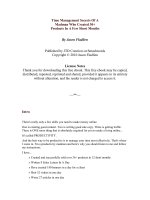20171012 time management punctuality
Bạn đang xem bản rút gọn của tài liệu. Xem và tải ngay bản đầy đủ của tài liệu tại đây (331 KB, 2 trang )
October 12, 2017
TIME MANAGEMENT & PUNCTUALITY
PART 1
PUNCTUALITY
1. Do you think it's important to be on time?
2. In your country is it important to be ontime?
3. How do you feel when others are late?
4. Are you, yourself, late very often?
5. How do you think you could improve and beon time more often?
6. Do you wear a watch?
7. Do you think everyone should wear a watch?
TIME MANAGEMENT
1. How do you manage (or, organize, or plan)your time?
2. Would you say you manage your time well?
3. Do you find it hard to manage your time?
4. How do you think you could better manage your time?
5. Do you think it's useful to plan your time?
6. What do you think you would gain if you were better at managing your
time?
7. Are you ever late for anything?
8. If you had more time, what would you do with the extra time?
PART 2 & 3
Describe an exciting book you have read.
You should say:
What the book is
When you read it
What the book is about
And explain why you felt excited
Part 3
1. What are some of the different reasons why people read books?
2. What are the best-selling types of books in your country?
Vincent CU
3. What do you think might be the best-selling books in the future?
4. Are motivational books very popular?
5. Do men and women tend to read the same types of books?
6. What are the main differences between adults' books and children's
books?
===============================
Describe a time when you arrived very early for an
appointment
You should say:
When and where it happened
Why you arrived early
What you did while waiting
And explain how you felt about arriving early.
Part 3
1. Why do people get late?
2. What occasion need people arrive on time?
3. Do you like to arrive earlier?
4. Who like time management, the old or the young?
SUGGESTIONS- PUNCTUALITY
Advantages of punctuality:
People have a great regard for a punctual man.
He is always successful in his work.
He commands a moral right over others. Other people will feel glad
that you value the importance of their time.
Your can avoid a lot of stress if you attend your duties on time.
Page 1 of 2
October 12, 2017
TIME MANAGEMENT & PUNCTUALITY
A punctual person inspires other people to be “on time”. In spite of all
their engagements, people try to be punctual every time and
everywhere.
How to be punctual?
Make a list of important tasks and appointments, schedule them,
and set a reminder for each of them.
Try to reach 15-20 minutes early than the appointment. This will create
a time-cushion.
Get your clothes, mobile phone, and other essential items ready a night
before in advance.
Learn to prioritize important tasks.
Take a realistic view of the tasks that you can really perform with the
pre-determined time.
TIME MANAGEMENT
Purpose of time management.
1. Saving money: using time efficiently makes our work more
profitable. As the saying goes, ‘time is money’, and in many contexts
this is very literally true.
2. Meeting deadlines: time management is an essential skill if we want
to meet our deadlines.
3. Achieving our goals: we can only achieve our goals if we have
enough time to take all of the necessary steps towards them.
4. Enjoying our leisure time: when we manage our time well, we find
that we have plenty of time left over to relax in.
5. Courtesy: it is courteous not to keep other people waiting whilst we
try and finish other tasks.
Vincent CU
Effective Time Management Techniques..
1. Be realistic about what you want to achieve and how much time you
have to do it in. Time management plans should always be achievable, and
we should always be able to carry them out without having to cause
ourselves undue amounts of stress or sleeplessness. Rather, we should feel
less stressed, and sleep better, because we are managing our time so well.
2. Make a plan: use a diary or calendar to manage your time. Have a
clear idea about what you should be doing at any given time – and
make sure to add in plenty of time to relax and spend time with your
loved ones alongside all of those work projects.
3. Prioritize: what activities are your priorities? Spending time with
your family, for example? Or, perhaps studying is your current priority?
Knowing what your priorities are will help you to see where you need to
apportion most of your time.
4. Take stock regularly: pause at regular intervals to check that you are
on track, and if you are not, be prepared to make some adjustments to
your style of working.
5. Delegate tasks: working as part of a team can help you to use time
efficiently. If everyone is given a task to do and everyone works on their
tasks at the same time, the overall project will be completed more
quickly than if you attempted to do all of the tasks single-handedly.
6. Do not waste time: think about all the activities that you do that
waste your time (such as browsing idly on the internet) and try and cut
down on them.
7. Remind yourself of the value of time. We all only have a fixed
amount of time on the earth, and once we have used up some of our
time, we cannot get it back. Staying constantly aware of this is a
brilliant way to motivate yourself to use your time well.
Page 2 of 2









